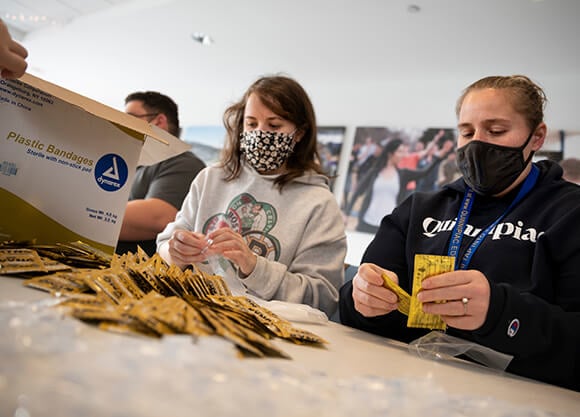
Clinical social work students put their final in the bag
January 04, 2022

January 04, 2022

More than a dozen students spent this morning filling bags to mitigate harm among some of the area’s most vulnerable populations — drug users and sex workers.
Amber Kelly, associate professor of social work, partnered with Mark Jenkins, executive director of the CT Harm Reduction Alliance, and Jaclyn Lucibello, program manager of the Sex Workers and Allies Network, to discuss the work of both organizations and get her students involved.
“Five percent of the world’s population resides in the United States, but what people don’t realize is that we make up 80 percent of the world’s prescription drug consumption,” said Jenkins.
He explained the war on drugs to shocked students and said that drugs are becoming similar to bootleg CDs and purses, not always sold in their original form. Jenkins added that there is economic gain for struggling individuals if they add to a drug to make it last longer, making it in selling condition.
“The epidemic is constantly changing and we have to stay on top of events as they unfold so that we can better reach the people we serve,” said Jenkins. “As a result of how municipalities are dealing with people who are actively using and unsheltered populations, we must constantly engage folks; it’s not like we can rest. We have to constantly be on top of how we are engaging people and how they view us.”
Jenkins said that the most challenge aspect of his job is educating individuals who already have stigma engrained in their minds regarding drug use.
“It is the stigma around use, the fact that it is seen as a moral failure, that people view most of our methods as enabling versus being a public health response,” said Jenkins. “Those remain our biggest obstacles, and funding, of course. There are so many meetings that take place regarding funding that it leaves less time to do the actual hands-on work.”
Lucibello, being a formerly incarcerated person and drug user, discussed her passion for the field of harm reduction.
“Part of why I love this is because it’s a different approach to the opiate epidemic we are facing in our country. We are still stuck in this archaic view from the 80’s of ‘just say no’ and the war on drugs,” said Lucibello. “We continue to use these same methods of treatment and approaches which aren’t working, that is why I love what I do because we take a different approach which is more radical, which not everyone understands or agrees with.”
Lucibello dove deeper into the importance of her approach and the bond of trust that is created during the process.
“This work allows us to build relations with most marginalized groups in society that don’t have connections to anyone or anything else. We can connect them to resources and really be that beacon of hope in their lives,” she said. “Harm reduction works and is a necessary tool during the drug epidemic.”
Kelly said that this workshop complimented the core of social work perfectly as it emphasized the importance of a relationship-based approach.
“A lot of what we have been talking about this term is using the relationship as the base for any clinical intervention and harm reduction prioritizes that. It is about making sure people stay safe and building a relationship so that they can keep other Connecticut residents safter,” said Kelly. “That is exactly what students are doing today, helping put together and bag supplies so that the organizations can continue to build those relationships as they consider relationally-based clinical social work.”
Kelly’s students expressed their gratitude for being able to do this as a final and loved the learning methods that she implemented inside and outside the classroom.
“The social work program overall has been really awesome because we do most of our learning hands-on and out in the real world,” said Neehen Rashid, a student in the class.
Quinnipiac Today is your source for what's happening throughout #BobcatNation. Sign up for our weekly email newsletter to be among the first to know about news, events and members of our Bobcat family who are making a positive difference in our world.
Sign Up Now